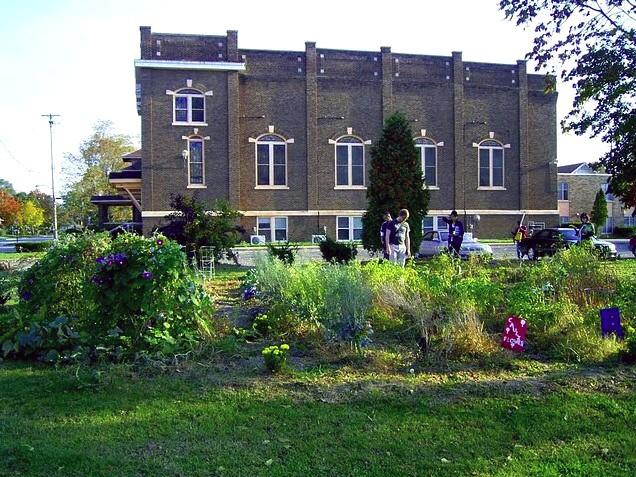Class creates community gardens in Muskegon

Courtesy Photo / Diane Miller Grand Valley State University Muskegon Community Garden visit with Charlotte Johnson from the McLaughlin Neighborhood Community Group, Carolyn Ulstad, Justin Minor, and Diane Miller.
Mar 14, 2011
Last semester, 10 students in Grand Valley State University’s Environmental Studies program went into the Muskegon community and helped design and create gardens as part of a newly created “Practicum on Sustainable Agriculture: Designing Sustainable Gardens.”
“Students study the physical, social, and economic characteristics of the community gardens they are assigned,” said Edwin Joseph, associate professor of Geography. “Each student is assigned a garden for the entire semester to learn how the garden operates, how decisions are made, the crop combinations, crop utilization and consumption. They then work with the gardeners to help improve the efficiency of the gardens and build a physical scaled model for proposing changes. They also study the demographics of the area.”
The purpose of the ENS 493 course is to provide basic skills in developing sustainable garden designs, space utilization, crop selection and water delivery systems.
Diane Miller, the environmental studies graduate assistant, helped Joseph bring working with the Muskegon community into the program.
“What came out of that was the ten students in the class were partnered with ten community gardens to build a relationship with the community to find out about the community needs and do research on the garden,” said Miller. “They were learning how to make these gardens better.”
At the end of the semester, students produced three-dimensional models and posters of their gardens.
The course was created to provide students with the opportunity to engage with communities and to learn first-hand how to develop more efficient gardens and how these gardens can improve quality of life through recreation, exercise, therapy, education and the production of nutritious foods.
“In short, ENS 493 provides opportunities for community engagement and empowers GVSU students by teaching them how to focus on community food needs and problem solving through civic engagement,” Joseph said.
Senior Carolyn Ulstad, geography major, took part in the practicum last semester for her environmental studies minor and said she and her classmates each worked to make the community garden to which they were assigned more sustainable and more efficient.
“It was very rewarding working with that garden and the community members,” Ulstad said.
There are a couple of courses at GVSU that focus on agriculture, but the Practicum on Sustainable Agriculture focuses on problem solving within the local communities and solving those problems with community involvement. Joseph said he is encouraged by the success of the practicum so far.
“In many ways, ENS 493 empowers GVSU students by teaching them how to focus on community food needs and problem solving through civic engagement,” Joseph said. “People are very enthusiastic about the program. It has gone very well and we are achieving our objectives.”
The garden models and posters created by the students while designing their individual community gardens are on display and can be viewed at GVSU’s Michigan Alternative and Renewable Energy Center (MARC) located on Viridian Drive in Muskegon.
“I think this is a really timely program because people are really starting to understand what it means to be sustainable and not just on a global level but a local level,” Miller said. “Being able to bring Grand Valley to Muskegon helps to teach at a local level and see how people really understand sustainability. For students, I think that students can really put their hands on something and make it their own when it is local.”






















